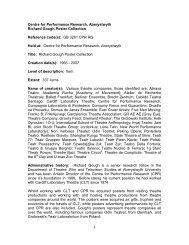Research Matters 16 - Aberystwyth University
Research Matters 16 - Aberystwyth University
Research Matters 16 - Aberystwyth University
Create successful ePaper yourself
Turn your PDF publications into a flip-book with our unique Google optimized e-Paper software.
<strong>Research</strong> esearch<br />
<strong>Matters</strong> atters<br />
@aber.ac.uk/english/<br />
_____________________________________________________________________<br />
Editorial<br />
This issue is devoted to the topic of the PhD in English. There has been much debate<br />
recently, in the Times Higher and elsewhere, on whether or not the scope and nature<br />
of the traditional PhD experience need to change and adapt. It is argued that change is<br />
needed because the academic profession itself is changing rapidly, as, indeed, is the<br />
wider world of teaching, research, the Arts, commerce, and business, and the many<br />
other professions in which English PhDs may go on to spend all or part of their<br />
careers.<br />
In the lead article, Lyn Pykett addresses the big issues which are now under scrutiny,<br />
and considers the changes in the ‘PhD process’ which have taken place in recent<br />
years. The remaining pieces are personal accounts from practitioners who have taken<br />
part in this process at various levels. Will Slocombe writes about the experience of<br />
being an external examiner: Jen Sattaur describes her experience of the PhD ‘endgame’<br />
of mock-viva and viva; Nicky Cashman gives a candidate’s account of the long<br />
pilgrimage from Registration to Judgement Day, and Peter Barry reflects on being<br />
internal examiner – that ‘duplicate’ figure who walks always in the shadow of the<br />
external.<br />
Your views and responses are invited and welcomed, whether you are internal or<br />
external to <strong>Aberystwyth</strong>, and whatever role(s) you have played in the great academic<br />
drama of the PhD.<br />
_____________________________________________________________________<br />
RM is an on-line research bulletin produced twice each semester in the English Department at<br />
<strong>Aberystwyth</strong> <strong>University</strong>. It publishes articles about researching in the broad field of English Studies.<br />
Anything to do with funding, grant applications, RAE/REF matters, AHRC matters, research training,<br />
attending and organising conferences, supervising research, the progress and problems of research, etc,<br />
will receive a sympathetic reading. Each issue is sent as a pdf-attachment to staff and research<br />
postgraduates in English and is posted on the staff pages of the departmental Intranet. We welcome<br />
unsolicited pieces from English colleagues (staff and postgraduate) both within and outside<br />
<strong>Aberystwyth</strong>, and we also invite both internal and external contributions on specific issues from time to<br />
time. RM is not a restricted document, and readers are welcome to copy it to anyone whom they think<br />
might be interested. Items should be sent as e-mail attachments to both editors:<br />
ptb@aber.ac.uk and scp@aber.ac.uk<br />
_____________________________________________________________________<br />
1<br />
No. <strong>16</strong><br />
February 2009<br />
Edited by<br />
Peter Barry & Sarah Prescott<br />
Advisory Editors<br />
Lyn Pykett & Diane Watt
Decline and Fall<br />
or Brave New World?<br />
The Changing Face<br />
of the PhD<br />
I am a product of the<br />
old-style apprenticeship<br />
– or ‘secret garden’ –<br />
model of the PhD: for<br />
good or ill, the student’s<br />
primary relationship was with a single<br />
supervisor rather than a department,<br />
faculty or university; research training<br />
was minimal. Thirty five years (or so)<br />
on from the completion of my own<br />
PhD experience I have just come to the<br />
end of an extended period as convenor<br />
of the English Language and Literature<br />
Postgraduate Panel of the AHRC and<br />
as a member of its Postgraduate Panel.<br />
This work, and some other work that I<br />
have recently done for the AHRC in<br />
connection with its Block Grant<br />
Partnership Scheme, leads me to<br />
believe that, despite the many reports<br />
on and reviews of the nature of the<br />
PhD in the last fifteen years, and<br />
despite growth of a range of generic<br />
research training and skills<br />
development training (of which more<br />
below), the apprenticeship model is<br />
still alive and well in English Studies<br />
and in the AHRC domain more<br />
generally. Almost every statement on<br />
research training that I have ever read<br />
indicates that the subject-specific<br />
element of research training will be<br />
provided by the supervisor. It is not<br />
felt necessary to go into details: we are<br />
all supposed to understand how<br />
research training will be provided<br />
through the supervisory process.<br />
Typed in triplicate<br />
Back in the days when the thesis was<br />
still typed in triplicate it was supposed<br />
2<br />
to be an original contribution to<br />
knowledge, and no-one was<br />
particularly concerned if it took ten<br />
years to complete. Indeed, in some<br />
circles, failure to complete a doctoral<br />
thesis in a timely fashion was a badge<br />
of honour, a sign of the magnitude of<br />
the project and the scholarly tenacity<br />
and rigour of the writer who was being<br />
inducted into the academy fraternity<br />
(sic). In this bygone era it was not<br />
unknown for people to get academic<br />
jobs before they had completed their<br />
thesis, or, having obtained a post, to<br />
abandon their doctoral thesis whilst<br />
they slowly simmered towards the<br />
great book which in some cases<br />
materialised but in others was<br />
endlessly deferred. Nowadays, of<br />
course, a PhD is a sine qua non for an<br />
academic post and an article or two<br />
plus a book contract deriving from the<br />
thesis are distinct advantages.<br />
In addition, today’s doctoral students,<br />
whether or not they are aiming for an<br />
academic career, must seek to<br />
complete their thesis in under four<br />
years (if they are registered as fulltime)<br />
and at the same time undertake<br />
subject-specific research training,<br />
generic research training and general<br />
skills training which fulfils the<br />
requirements of the RCUK statement<br />
of skills. Increasingly they will be<br />
required to engage with the<br />
employability skills training which<br />
HEIs are being pressed to provide and<br />
also to engage with the Knowledge<br />
Transfer and Exchange agenda. This is<br />
the context for the recent diatribes in<br />
the Higher and elsewhere about the<br />
decline of the PhD.<br />
PhD-in-decline?<br />
As far as I can tell, the PhD-in-decline<br />
lobby take the view that the quality of<br />
the PhD thesis (the PhD product) has<br />
declined because of the (regrettable)
changes in the PhD process which I<br />
have sketched in above. I don’t<br />
subscribe to the decline model. To be<br />
sure, the nature of the PhD thesis has<br />
changed because of these changes to<br />
the PhD process. In my view, many of<br />
these changes were long overdue. This<br />
is not to say that we have got<br />
everything absolutely right. Many of<br />
these changes have come as result of<br />
the current dominance of an<br />
instrumentalist view of education with<br />
which many of us feel uncomfortable.<br />
However, changes to the PhD process<br />
were necessary for a number of<br />
reasons.<br />
First, there has been a significant<br />
increase in the numbers of PhD<br />
students since the first expansion of<br />
UK HE in the 1960s. Not all of these<br />
students could possibly become<br />
academics and many of them do not<br />
want to. In 2006 UKGrad published a<br />
report (What do PhDs do?) tracking<br />
destinations in 2003, 2004 and 2005.<br />
This report showed that arts and<br />
humanities doctoral graduates had a<br />
lower than average employment rate<br />
and were more likely to be on shortterm<br />
contracts or in self-employment<br />
than the total PhD population. Of those<br />
in employment around 50% of the arts<br />
and humanities PhD graduates were<br />
‘teaching professionals’ (45.2% in<br />
2003, 50.7% in 2004 and 48.2% in<br />
2005). In the review period, between<br />
6% and 8% went into Marketing,<br />
Sales, Media and Advertising; between<br />
6% and 9% became commercial,<br />
industrial or public sector managers;<br />
between 24% and 28% went into<br />
‘other technical and professional’<br />
occupations. Also in 2006, the<br />
AHRC’s survey of the career<br />
destinations of that relatively small<br />
minority of arts and humanities<br />
students that it funds showed that 74 %<br />
of the sample who were in<br />
employment had jobs in higher<br />
3<br />
education, 11 % worked in a wide<br />
range of public organisations, 8 % in<br />
independent organisations such as the<br />
non-profit sector, and 7% in the private<br />
sector. So, the PhD process must<br />
address the needs of the substantial<br />
number of doctoral students who do<br />
not become academics. It must prepare<br />
students for a range of demanding<br />
careers by fostering intellectual<br />
development and developing critical<br />
thinking whilst, at the same time,<br />
providing a range of research training,<br />
including ‘training through doing’, that<br />
is, through undertaking a research<br />
project and producing a research<br />
output. Moreover, very few doctoral<br />
students, even those who wish to<br />
become academics, will spend their<br />
whole lives undertaking solitary tasks<br />
in a timeless universe, so skills<br />
development focused on working in<br />
groups, working under pressure and to<br />
deadlines, and communicating within<br />
and with a wide range of individuals<br />
and groups is a very good idea.<br />
The doctoral process<br />
For those wishing to have a career<br />
teaching and researching in an HEI in<br />
the 21 st century, the doctoral process is<br />
a necessary stage in their training and<br />
development. And here I really do<br />
mean the doctoral process and not just<br />
the doctoral product, or thesis. To be<br />
sure the production of the thesis is a<br />
key part of the doctoral process. It is<br />
the means by which apprentice<br />
academics hone their intellect and<br />
research skills and – in the case of<br />
literary studies – learn what it means<br />
to seek to make a contribution to<br />
criticism and/or scholarship which is<br />
significant, rigorous and original (to<br />
use the terms which the latest RAE has<br />
promulgated). However, there are all<br />
sorts of things that budding academics<br />
need to learn – and they need to be<br />
supported in their learning: how to
teach and assess students (or facilitate<br />
the learning process, as we must now<br />
term it); how best to disseminate their<br />
research; how to give a conference<br />
paper; how to go about the business of<br />
getting published; how to initiate<br />
and/or engage with academic networks<br />
and organise conferences. All this<br />
seems blindingly obvious, and on the<br />
whole, today’s doctoral students<br />
engage energetically with all of these<br />
aspects of the PhD process which are<br />
essential for career development and<br />
CV building. I also happen to think<br />
that they are intrinsically a good thing<br />
to do. Far from ‘diluting’ the PhD<br />
experience, I think that the modern<br />
PhD process enriches it. Perhaps my<br />
view is coloured by the fact that I can<br />
(just about) recall a time when the PhD<br />
process was one in which students<br />
were left pretty much on their own to<br />
find out more and more about less and<br />
less; when it was assumed that they<br />
could just go into a classroom and<br />
teach because they had themselves<br />
experienced the process of being<br />
taught (often rather badly I might add);<br />
when they might find themselves<br />
giving a paper to a specialist seminar<br />
having received no guidance<br />
whatsoever, and so on.<br />
The PhD process as a stage<br />
As I indicated earlier, it is likely that<br />
the PhD process will have elements<br />
added to it in the near future in the<br />
form of the further development of<br />
both employability and knowledge-<br />
transfer awareness and skills. I expect<br />
to see developments which link to the<br />
increasing emphasis placed by RCUK<br />
and others on collaborative working<br />
and working across disciplinary<br />
boundaries. Notwithstanding the<br />
British Academy’s reduction of its<br />
postdoctoral awards, the increasing<br />
availability of postdoctoral awards<br />
from other sources and the emergence<br />
4<br />
of an array of early and mid-career<br />
research development awards is<br />
evidence of a growing<br />
acknowledgement that the PhD process<br />
and product are just a stage – albeit an<br />
important one – in the development of<br />
a researcher.<br />
Lyn Pykett<br />
_______________________________<br />
Lyn Pykett is Pro Vice Chancellor for<br />
<strong>Research</strong> and Professor of English at<br />
<strong>Aberystwyth</strong>. Her most recent book, Authors in<br />
Context: Wilkie Collins (2005) has just been<br />
re-issued by Oxford World’s Classics in the<br />
influential ‘Authors in Contexts’ series.<br />
_______________________________<br />
The Outsider,<br />
or, On Being an<br />
External Examiner<br />
Most people remember<br />
their first meeting with<br />
their external examiner.<br />
More often than not,<br />
despite the fact that<br />
candidates have normally read at least<br />
some of the external’s work<br />
beforehand, it’s during the viva voce<br />
that they first encounter them in<br />
person. It’s a nerve-wracking occasion<br />
anyway, but the presence of this<br />
stranger, this outsider, can make it all<br />
the more so. Recently, I adopted this<br />
‘outsider’ role, having been asked to<br />
act as an external examiner on a thesis<br />
for the first time. Given my own<br />
sojourn as a PhD candidate, I was keen<br />
to use my old ‘inside’ perspective to<br />
inform my new ‘outside’ one. Here are<br />
some reflections on that experience…<br />
Before the viva<br />
Upon receiving the thesis and finding<br />
the time to open it, I first checked the<br />
table of contents and pagination, and
then read the abstract and the<br />
bibliography. This gave me a good<br />
overview of the project and its scope.<br />
The main task, however, was to read<br />
the thesis and it took a relatively long<br />
time. I suspect it’ll get easier as I gain<br />
more experience, but I don’t think I’ll<br />
ever be a quick reader. Not only do I<br />
feel the burden of the fact that the<br />
thesis represents at least three years of<br />
a candidate’s life (and therefore needs<br />
to be given the attention such an effort<br />
deserves), but — more mundanely — I<br />
proof-read as I read and this takes<br />
time.<br />
Whilst reading the thesis, my primary<br />
concern was the balance between<br />
knowledge and originality, as the PhD<br />
thesis is an unusual beast. It must show<br />
advanced learning in a particular field,<br />
thereby demonstrating knowledge of<br />
what has already been produced.<br />
However, it must also propose original<br />
ideas (one of the criteria by which a<br />
PhD is judged), often at the expense of<br />
received wisdom. Judging the relevant<br />
balance of these can be a difficult task,<br />
and depends heavily upon the nature of<br />
the thesis.<br />
After reading the thesis, and a week<br />
before the viva, the examiners<br />
independently submit their reports.<br />
These recommendations are subject to<br />
change, but offer a variety of ‘pass’<br />
options, from no changes required,<br />
through minor amendments (normally<br />
correcting errors), to more substantial<br />
revisions (re-writing sections or<br />
chapters and possibly even re-drafting<br />
the entire thesis). For me, the most<br />
difficult thing was to summarise my<br />
thoughts on the thesis into the 300word<br />
report, and balance the<br />
descriptive elements (to show the<br />
candidate’s attainment of the<br />
assessment criteria) with the more<br />
intellectual elements that commented<br />
on scope and contribution to the<br />
5<br />
subject. In the end, I took 450 words,<br />
and that still wasn’t enough.<br />
In the viva<br />
Although the external controls the<br />
tempo and order of questions (most<br />
internal examiners defer to the external<br />
in this regard), their power is not<br />
absolute. Some institutions, for<br />
example, prohibit telling the candidate<br />
the result of the thesis at the beginning<br />
of the viva. Obviously, such comments<br />
are subject to change inasmuch as the<br />
candidate must still demonstrate that<br />
the thesis is their own work.<br />
Nevertheless, the practice of informing<br />
candidates of the result at the start is<br />
something with which I’m not<br />
comfortable. The viva is a formal<br />
examination, not an examination<br />
formality, and to tell the candidate the<br />
‘result’ can transform it into a tedious<br />
Q&A exercise rather than a chance to<br />
debate the thesis in detail.<br />
The precise nature of the questions is<br />
dependent upon the examiners. I<br />
adopted a partially Socratic approach,<br />
asking a (relatively) simple question to<br />
begin, and then proceeding to more<br />
challenging questions on the same<br />
subject. For example, the first question<br />
on a topic could be to define a concept<br />
that is discussed within the thesis. This<br />
is not because it hasn’t been read, but<br />
to test how well the candidate knows<br />
their thesis, and allow them to directly<br />
refer to it; ‘Well, as I say in chapter<br />
two…’ From that point, it is possible<br />
to debate such definitions. This is not<br />
to make the candidate question their<br />
entire thesis and push them into a<br />
corner, but to pull them into more<br />
complex discussions and encourage<br />
them to talk about and around the<br />
thesis. Contrary to popular belief,<br />
external examiners are people too and,<br />
rather than seeking to fail a thesis,
we’re asking the candidate to<br />
demonstrate its strengths.<br />
Other questions can include asking<br />
about the nature of the contribution the<br />
thesis makes to the field, why a<br />
particular methodology or text was<br />
selected, and even—something learnt<br />
from my own external examiner—<br />
picking up on rhetorical nuances.<br />
Being asked ‘Do you feel that your use<br />
of the paralogical word ‘suggests’<br />
weakened your argument?’ was<br />
intimidating, but it demonstrated the<br />
level of scrutiny that an examiner<br />
brings to the thesis. The purpose of the<br />
viva is, after all, to examine the entire<br />
thesis, and such attention to detail is<br />
invaluable later in re-writing the thesis<br />
as a monograph.<br />
Finally, the act of sending the<br />
candidate out at the conclusion of the<br />
viva may often seem unnecessary, but<br />
it allows the examiners to confirm (or<br />
amend) their initial recommendations<br />
and gives them the opportunity to<br />
agree formal comments on the<br />
candidate’s viva. Interestingly, in the<br />
institution I examined in, this period<br />
also included the chair commenting<br />
upon the conduct of the examination.<br />
That is, both the internal and external<br />
examiners had their viva performance<br />
commented upon. This ensured that<br />
nothing untoward had occurred, and<br />
served to reassure me too.<br />
After the viva<br />
One of the most pleasant aspects of<br />
being an external examiner is the time<br />
after the viva (assuming all has gone<br />
well). For me, the purpose of the<br />
external is to both examine the project<br />
and offer the candidate advice for the<br />
future. I imagine I’ll be contacted in<br />
due course regarding a monograph<br />
deriving from project, and expect to act<br />
as a referee for both academic jobs and<br />
6<br />
postdoctoral funding applications. In<br />
order to do be able to do this<br />
knowledgeably, and after an hour-anda-half<br />
examination, post-viva ‘coffee<br />
and cakes’ or an evening meal is a<br />
must, to informally chat with both<br />
candidate and supervisors. As much as<br />
this is an opportunity to catch up with<br />
colleagues in the field, however, it is<br />
vital to remember, as Jeremy Hardy<br />
says, ‘It’s not about you.’ This is the<br />
candidate’s day, and although externals<br />
are treated like royalty (albeit not like<br />
Charles I or Edward II), we’re only<br />
there because of the candidates; I think<br />
it’s worth getting to know them a little.<br />
Acting as an external examiner carries<br />
responsibilities to both the discipline<br />
and the candidate, and it takes time,<br />
care, and more time and care. Yet were<br />
anybody to ask me to do it again, my<br />
answer would be simple: ‘Yes.’<br />
Will Slocombe<br />
Will Slocombe is Lecturer in Twentieth-<br />
Century Literature at <strong>Aberystwyth</strong> <strong>University</strong>.<br />
His research interests are diverse, and he is<br />
always happy to discuss issues such as the<br />
above. He thanks all the relevant parties at the<br />
institution in which he examined for making<br />
his first external examination so<br />
straightforward.<br />
Surviving your Viva<br />
(and Mock-Viva)<br />
Asked to provide a report<br />
on one’s Viva Voce<br />
barely a month after the<br />
actual event, I suppose<br />
the first response is a<br />
faint feeling of nausea,<br />
intermixed curiously with pride. There<br />
is no getting away from the fact that<br />
the impending viva is alarming; many
months of stress and exhaustion<br />
precede the final, nerve-wracking<br />
moment when you are faced with a<br />
several-hour interrogation session,<br />
which boils down to, in essence, one<br />
ultimate question: ‘why should we let<br />
you join this club?’<br />
In all seriousness, however, it is a<br />
relatively straight-forward and painless<br />
procedure, once the attendant paranoia<br />
and mystification are stripped away<br />
(barring the submission forms which,<br />
seen with hindsight, remain an<br />
impenetrable form of torture). I was<br />
lucky in that I can honestly say I had<br />
excellent supervision and support from<br />
those around me in the crucial run-up<br />
period, which made the whole<br />
experience, if not pleasant, then at least<br />
manageable. But asked to offer tips or<br />
advice, there are three points I would<br />
suggest to those still waiting to<br />
approach the bench: panic enough but<br />
not too much; put nearly all of your<br />
effort into worrying about the mockviva;<br />
and be prepared to agree to things<br />
indiscriminately.<br />
‘That gap in chapter two’<br />
The first is perhaps the most important<br />
to remember. People will either spend<br />
the weeks leading up to the viva telling<br />
you that it will all be fine, and not<br />
worry; or else, they will fill you up<br />
with horrifying stories about their own<br />
viva or those of people they have<br />
known in the past. Obviously, the<br />
more you are told not to worry, the<br />
more you worry: it is an inverse law.<br />
On the other hand, the chances are that<br />
having gotten as far as you have, there<br />
is little cause to suspect that you will<br />
be in danger of any horrifying<br />
outcome. The trick is to find<br />
something small and only relatively<br />
important on which to focus your<br />
worry – such as the tortuous<br />
submission forms, or that gap in<br />
7<br />
chapter two which you are quite sure<br />
one of your examiners will question.<br />
Not worrying at all is a physical<br />
impossibility, but I found that<br />
worrying about something small and<br />
concrete was helpful when it came to<br />
keeping calm – even if it did mean<br />
reading chapter two at strange times of<br />
the night. And that old favourite that<br />
people pull out to comfort you with –<br />
that it will be enjoyable discussing<br />
your work with people who have read<br />
it in detail and understood it – is, in<br />
fact, true. So, worry, but not too much.<br />
Proportionality is important.<br />
The tough mock-viva<br />
The mock-viva is an extremely<br />
valuable tool, and without it I very<br />
much doubt I would have found the<br />
focus necessary to revise for the viva at<br />
all. It is usually run a week before<br />
your real viva by two members of the<br />
department who are not your<br />
supervisor(s), who will read a section<br />
of your work (in my case, it was the<br />
introduction), and then run the mockviva<br />
in exactly the way your real viva<br />
will be run, asking you the sorts of<br />
questions you might expect to be asked<br />
on the day, and maintaining the sort of<br />
atmosphere you might encounter on<br />
the day. Worry about it as you would<br />
worry about your real viva. In the first<br />
place, doing so is excellent preparation<br />
for the real thing: the extra revision<br />
will make you feel calmer in the end.<br />
In the second place, you will not then<br />
have too much energy left over for<br />
needless worry in the last days before<br />
the real viva. And for members of the<br />
department who may be conducting<br />
mock-vivas in the near future, I should<br />
add that I found a tough mock-viva to<br />
be very valuable: I found I came away<br />
with confidence that if I could survive<br />
the mock, I could survive anything.
And finally, as terrible as it sounds, I<br />
found it calming to remember that the<br />
viva is not the end of the line of the<br />
thesis. Your examiners are not looking<br />
for a finished (polished, static) piece of<br />
work, they are not publishers, and you<br />
will not be leaving your work alone<br />
once the viva is over. In other words,<br />
it is important to make sure your<br />
examiners come away with a clear<br />
sense that you understand your subject,<br />
are aware of your limitations, and are<br />
eager to make such adaptations as they<br />
feel are necessary to make your thesis<br />
as good as it can be. However, your<br />
examiners do not have the final word<br />
on the shape of your project. It is safe<br />
to agree to changes you might not<br />
necessarily be convinced by; you will<br />
have a court of appeal when it comes<br />
to sending the book for publication.<br />
And besides, you will probably find<br />
that the examiners were right in the<br />
end. Your examiners are also an<br />
excellent source of advice on the<br />
adaptations you should make to your<br />
work before trying to publish it, so<br />
take full advantage of this – ask them<br />
questions, and treasure the readers’<br />
reports you receive afterwards.<br />
The nerve-wracking bit<br />
The viva itself is relatively painless.<br />
There are typically four or five people<br />
in the room: yourself, the internal and<br />
external examiners, the chair, and your<br />
supervisor if you have requested that<br />
he or she be present. The chair sets the<br />
room up, explains the procedure for the<br />
viva, and invites you to enter or leave<br />
the room at the appropriate times. It is<br />
up to you whether you have your<br />
supervisor present or not, but I found it<br />
very reassuring and somehow soothing<br />
to have mine present. After the<br />
questions have been asked and<br />
answered, and you have asked any<br />
questions of your own, the examiners<br />
will ask you to leave the room while<br />
8<br />
they make their decision. This is the<br />
nerve-wracking bit; I would<br />
recommend having coffee to hand. As<br />
to the questions themselves, I found<br />
one piece of advice to be very good:<br />
don’t be afraid to ask for more time to<br />
consider a question, or to come back to<br />
a question later. But, I must add a<br />
proviso: don’t forget to think of an<br />
answer for when they do come back to<br />
it!<br />
On the whole, the viva is a thorny<br />
experience; but in the end the reward is<br />
worth much much more than the pain<br />
of gaining it. Welcome to the club.<br />
_______________________________<br />
Jen Sattaur was awarded her PhD in late 2008<br />
at <strong>Aberystwyth</strong>: her topic was representations<br />
of childhood in late Victorian fiction, and she<br />
is now in discussion with a number of presses<br />
for the publication of her ‘book-of-the-thesis’.<br />
_____________________________________<br />
The long road to the PhD<br />
I began my academic<br />
journey as a mature<br />
student in Coleg<br />
Ceredigion in 2000. As<br />
a result, I was accepted<br />
by <strong>Aberystwyth</strong> and<br />
chose to do a BA in English. In 2004 I<br />
was successful in gaining funding for<br />
my Masters and then for a PhD starting<br />
in 2005. This meant that life as a<br />
student was guaranteed for three<br />
seemingly long years. I entered into the<br />
PhD with some trepidation. Stories<br />
abound of those who drop out, dry up<br />
and falter at the final hurdle. It leaves<br />
one feeling nervous at what might lie<br />
ahead, and yet also with a sense of<br />
belonging to a rather small and select<br />
community of students.<br />
The early days<br />
The research modules were the first<br />
elements of the PhD that I
encountered. Many mutterings were to<br />
be heard by those who didn’t want to<br />
be there, and yet, I met several<br />
postgraduates from a variety of<br />
disciplines who I am still friendly with<br />
three years later. I always felt that<br />
amongst the myriad information given,<br />
there was usually something specific<br />
for me to take away for my research;<br />
one such was ‘time management’.<br />
Though it seemed an obvious thing, the<br />
reality was somewhat different.<br />
Initially, time was taken up with<br />
assignments for the research modules,<br />
so, along with one’s own study, the<br />
days, weeks, and first semester flew<br />
by. When the modules came to an end,<br />
the structure of the week seemed to<br />
disappear and suddenly it was up to me<br />
to organise my time.<br />
Study time<br />
This was a stage of my research when<br />
that mysterious entity called ‘time<br />
management’ would come into play.<br />
So, I duly sat down and drew up a<br />
weekly planner, taking into account all<br />
other areas of my life. Having a young<br />
family meant that it was difficult for<br />
me to work after a certain time and still<br />
keep my sanity. Therefore, I decided<br />
that for me, a five day week with full-<br />
time hours was the way forward. It<br />
didn’t always work out. There are so<br />
many things that happen that are<br />
unexpected. So, I took the attitude that<br />
I had to make up some of that time<br />
wherever possible, even if that meant<br />
evenings and week-ends.<br />
I was always particularly keen to hand<br />
in work and keep deadlines set by my<br />
supervisor because it made me feel that<br />
I was on target and heading in the right<br />
direction. Problems arose when I<br />
didn’t manage to work as much as I<br />
wanted; sometimes, I would fall into<br />
the classic trap of putting things off till<br />
the following day. Then I would feel a<br />
9<br />
sense of guilt and the only thing that<br />
made me feel better was to work. The<br />
trick for me was simply to pick up a<br />
book relevant to my research. This<br />
would be a gentle way back into study<br />
and would always lead me back –<br />
academically and psychologically – to<br />
where I needed to be.<br />
The PhD often felt like a roller-coaster<br />
ride of emotions. There would be days<br />
when work would progress well and<br />
the writing would flow. On another<br />
occasion, I had to delete a complete<br />
chapter that I felt no longer had a place<br />
in the thesis as a whole – around<br />
10,000 words! I worked hard on one<br />
particular chapter and had an article<br />
accepted by an important journal, but<br />
the elation of something like this could<br />
be undermined by my own lack of<br />
confidence in another section of the<br />
thesis. However, the continual<br />
encouragement from the department,<br />
friends and family, and a deep-seated<br />
desire to succeed, kept me determined<br />
and focused.<br />
For me, part of being a postgraduate<br />
also meant being a member of the<br />
British Association of American<br />
Studies and this entailed submitting<br />
papers for the international<br />
conferences – one of which became the<br />
accepted article. I went to Canterbury,<br />
Leicester and Edinburgh; all new<br />
places with new people to meet. I<br />
thoroughly enjoyed going to these<br />
annual events despite the nervousness<br />
of presenting in front of established<br />
academics. My confidence grew with<br />
each and every experience. The PhD<br />
was offering me a chance to do so<br />
much more than study, and I was more<br />
than happy to accept all it could<br />
possibly give.<br />
‘Writing up’<br />
The first two years had gone by so<br />
quickly, but I still kept an eye on my
final submission date – 30 th September<br />
2008. My final conference had been<br />
attended and discussions of potential<br />
external examiners became the topic of<br />
conversation, rather than research. For<br />
a while, I had felt that each chapter had<br />
a life of its own and I couldn’t see how<br />
it was all going to fit together.<br />
However, once editing began in<br />
earnest, the thesis began to gel. My life<br />
now revolved around editing, tidying<br />
up references, double checking the<br />
bibliography and generally making<br />
sure that the presentation was as<br />
perfect as possible.<br />
Meanwhile, the intention-to-submit<br />
form was filled in, my internal and<br />
external examiners were organised and<br />
the editing continued unabated. There<br />
came a point when I had to decide<br />
when to stop and have the thesis<br />
printed and bound. It was when my<br />
supervisor commented that he was<br />
happy if I was happy to hand in the<br />
thesis that I finally did so. Once<br />
handed in to the department, there was<br />
a moment of euphoria followed swiftly<br />
by a sense of ‘What now?’ Suddenly,<br />
evenings and weekends became free of<br />
research, writing and referencing and it<br />
took a while to not feel guilty over<br />
doing nothing!<br />
The next moment of pure anxiety came<br />
when the date of the viva was set – 18 th<br />
December 2008. The mock viva was<br />
organised for the week before and this<br />
ended up being the best rehearsal I<br />
could have. I was questioned for over<br />
an hour on my work which made me<br />
focus my thoughts, and along with<br />
extra guidance from several willing<br />
academics from the department, this<br />
meant that I was as prepared as I could<br />
be for the main event. Nerves,<br />
adrenalin and my supervisor<br />
accompanied me into the room on the<br />
18 th December. However, what I had<br />
built up to be a terrifying inquisition<br />
10<br />
became an in-depth discussion of my<br />
research, my reasons and results. The<br />
feeling of being told I had passed was<br />
probably one of the best moments<br />
imaginable. The grin that spread across<br />
my face did not fade for days.<br />
Memories of that day still have the<br />
power to make me smile.<br />
Nicky Cashman<br />
_____________________________________<br />
Nicky Cashman’s thesis on Self, Family and<br />
Community in African American Literature,<br />
1940-1970, was successfully completed at<br />
<strong>Aberystwyth</strong> in January. She currently<br />
manages CADAIR, the <strong>University</strong>’s online<br />
repository.<br />
_______________________________<br />
The Insider,<br />
or, On Being an<br />
Internal Examiner<br />
I sometimes wonder<br />
(and sometimes while<br />
actually doing it) what<br />
internal examiners are<br />
for. I mean as<br />
examiners, rather than as the main<br />
host-figure on the big day – the person<br />
who shows the external where the loos<br />
are, and provides such essentials as<br />
coffee, the use of a computer, and<br />
somewhere secure to leave coats and<br />
bags which would otherwise have to be<br />
carted round all day. These are<br />
important duties, and entirely pleasant<br />
to perform, but they are really just the<br />
side-effects, so to speak, of being one<br />
of the examiners. So I ask again, what<br />
are internal examiners for?<br />
No such question ever need be asked<br />
of external examiners, for their role is,<br />
self-evidently, to be the independent<br />
subject expert and ‘scholarly<br />
scrutineer’ who ensures that the thesis<br />
is a genuine contribution to knowledge<br />
in its field or sub-field. The internal’s
ole, by contrast, is much less definite,<br />
so much so that he or she can often<br />
seem to be just a pale shadow of the<br />
external, someone who also has<br />
expertise in the sub-field of the PhD<br />
topic, but not quite so much of it (since<br />
if they had, they would presumably<br />
have been the supervisor rather than<br />
the ‘mere’ internal).<br />
Just a witness?<br />
So in what ways might internals define<br />
and refine their roles and hence feel<br />
that they contribute something<br />
distinctive to the viva? For it is<br />
certainly dispiriting for an internal to<br />
sense that they are really just there as a<br />
witness - someone whose most<br />
important contribution to the<br />
examination process is a signature on<br />
the sheaf of pink, yellow, blue and<br />
green forms which have to be<br />
processed at the end of the<br />
proceedings. If the internal is truly<br />
little more than a glorified witness,<br />
then the considerable work of reading<br />
the thesis, and then composing a<br />
detailed critique and a set of pertinent<br />
questions seems rather a waste of time.<br />
Perhaps one useful way to conceive of<br />
the internal’s role is to see it as<br />
providing the breadth of knowledge<br />
and expertise which complements the<br />
external’s depth. On this model, the<br />
internal’s questions would be broader<br />
in scope than the internal’s, aimed<br />
more at finding out (for instance) about<br />
the candidate’s sense of the<br />
relationship between the main<br />
author(s) studied and the period as a<br />
whole, rather than just about the<br />
author’s specific texts and ideas. An<br />
internal with such a brief might<br />
usefully be thought of as a<br />
‘dissemination scrutineer’, rather than<br />
a ‘scholarly scrutineer’, that is, as<br />
someone whose job is to ensure that<br />
the thesis is capable of communicating<br />
11<br />
to an audience beyond its immediate<br />
sub-field, and of meeting basic criteria<br />
of readability and accessibility.<br />
From thesis to book<br />
Such a distinction would recognize that<br />
there is a potential conflict between the<br />
profession’s need for scholarliness and<br />
originality on the one hand, and<br />
considerations of impact, knowledgetransfer,<br />
and dissemination on the<br />
other. The effect of this shift in the<br />
internal’s role might be to close the<br />
gap a little between the thesis and the<br />
book-of-the-thesis which most<br />
candidates hope eventually to develop<br />
from it. In this way, the two examiners<br />
would reflect the contrasting demands<br />
of the two poles of the ‘dual support’<br />
system of research funding in the UK.<br />
Thus, the RAE/REF pursues an ideal<br />
of pure academic excellence, based on<br />
the assumption that research of high<br />
quality is recognisable as such by<br />
competent peers in its own field, and<br />
that they alone are able to decide that a<br />
given piece of research is ‘an essential<br />
point of reference in its field or subfield,<br />
mak[ing] a contribution of which<br />
every researcher in the field ought to<br />
be aware’ (RAE 2008 documentation,<br />
my italics). But the AHRC measure of<br />
excellence is very different. To receive<br />
grant funding, AHRC applicants must<br />
be aware of the demands of<br />
‘knowledge transfer’, which means<br />
‘interaction with other audiences’ (my<br />
italics, and I take ‘other’ to mean other<br />
than a narrow group of relevant<br />
professional sub-fielders). Successful<br />
grant applicants must produce research<br />
which is ‘widely disseminated’, and<br />
which seeks ‘interaction with other<br />
audiences’. So on this model, the<br />
external examiner would put to the<br />
candidate RAE/REF-type questions,<br />
speaking on behalf of other researchers<br />
in the same field, while the internal<br />
would speak from the AHRC
viewpoint, and put questions on behalf<br />
of the ‘other audiences’ who might<br />
potentially derive some benefit and<br />
insight from the thesis.<br />
Changing the bowling<br />
Of course, that is not the whole of the<br />
matter, for sometimes, the internal’s<br />
function is more practical: for instance,<br />
it is difficult to make notes when<br />
engaged in the to-and-fro exchange of<br />
questioning, prompting, and seeking<br />
supplementary points. Hence, a change<br />
of bowling can be useful, enabling the<br />
external to jot down a few brief notes<br />
and re-organise the remaining<br />
questions. Sometimes, too, an external<br />
can seem to be driving rather<br />
relentlessly at the same point for quite<br />
a long time, causing the candidate’s<br />
batting to become cramped and<br />
negatively defensive. In these<br />
circumstances, an internal can provide<br />
a change of mood, helping the<br />
candidate to regain poise and fluency.<br />
Overall, two questioners will find out<br />
more than one (which is why interview<br />
panels usually consist of several<br />
people). But it would, I think, be of<br />
benefit to all parties if we were able to<br />
establish a few broad distinctions<br />
between the examining briefs of the<br />
two examiners. It would still be the<br />
case (and quite rightly) that the final<br />
say on the outcome would belong to<br />
the external – PhD externals in that<br />
regard have greater powers than<br />
undergraduate externals – but the<br />
internal should have a more distinct<br />
and defined area of responsibility than<br />
is presently the case, and would<br />
therefore have a greater sense on the<br />
day of performing a specific role, not<br />
just as a host, but also as an examiner.<br />
Peter Barry<br />
This piece draws on an earlier article in the<br />
Times Higher and anticipates points to be<br />
made at a forthcoming conference ‘The<br />
Doctor's Dilemma: the PhD in English studies’<br />
_____________________________________<br />
12<br />
PRESS RELEASE - 20.2.09<br />
An all-women shortlist of Welsh writers has<br />
been chosen to compete for one of Wales's top<br />
literary prizes next month.<br />
The four writers will be vying for the £2,000<br />
Roland Mathias Prize for Welsh writing in<br />
English, which will be awarded on Friday 27<br />
March in Brecon at a ceremony supported by<br />
BBC Wales and hosted by Nicola Heywood<br />
Thomas, presenter of BBC Radio Wales's Arts<br />
Show. All the shortlisted writers will be<br />
invited to talk about their work.<br />
The biennial prize is awarded for a work<br />
published during the last two years in the field<br />
of poetry, short stories, literary criticism or<br />
Welsh history. For the first time, the judges<br />
have chosen two works of literary criticism,<br />
charting the history of Welsh writing.<br />
A university lecturer at<br />
<strong>Aberystwyth</strong>, Sarah<br />
Prescott is shortlisted for her<br />
latest work, Eighteenth<br />
Century Writing From<br />
Wales: Bards And Britons<br />
(published by <strong>University</strong> of<br />
Wales Press). The book is<br />
described as bringing<br />
together ‘poems and<br />
sermons, travel writing and antiquarianism,<br />
translation and prose fiction’ which show ‘the<br />
sense of Welsh distinctiveness and strength of<br />
national feeling during a period usually<br />
characterised as one of Anglicisation’.<br />
Also selected is Jane Aaron, Professor of<br />
English at the <strong>University</strong> of Glamorgan, for<br />
Nineteenth Century Women's Writing In<br />
Wales: Nation, Gender And Identity (also<br />
published by the <strong>University</strong> of Wales Press).<br />
The book introduces readers to 100 Welsh<br />
women authors writing in both languages.<br />
Also on the shortlist are a poet and a writer of<br />
short stories. Sheenagh Pugh, who lives in<br />
Cardiff, is nominated for her latest poetry<br />
collection, Long Haul Travellers (published by<br />
Seren). The short-story writer is Carys Davies,<br />
shortlisted for her collection Some New<br />
Ambush (published by Salt).
Recent Books from the<br />
<strong>Aberystwyth</strong> English Department<br />
The latest poetry collection<br />
from Richard Marggraf<br />
Turley is published by Salt<br />
on 1 st March 2009. It is<br />
entitled Wan-Hu’s Flying<br />
Chair, and it ‘explores the<br />
“furious stillness” of love<br />
and art.’ The terrific title<br />
poem was first aired at the<br />
<strong>Aberystwyth</strong> Poetry Workshop, which is<br />
organised by Matthew Francis, and has seen an<br />
astonishing number of poetry collections and<br />
magazine contributions published by its<br />
members since its inception in 2004. The<br />
Cambridge-based ‘Salt Publications’ has<br />
become to contemporary poetry in the postmillennial<br />
era what Bloodaxe Books was in<br />
the1980s and 90s. It is, in other words, the<br />
home of many of today’s cutting-edge poets,<br />
poetry, and poetics. It is, in other words, the<br />
home of many of today’s cutting-edge poets,<br />
poetry, and poetics.<br />
The third edition of Peter<br />
Barry’s Beginning Theory was<br />
published by Manchester<br />
<strong>University</strong> Press at the end of<br />
January, with two new chapters:<br />
chapter 14 is ‘A history of<br />
theory in ten events’, and chapter 15, ‘Theory<br />
after theory’, gives the low-down on such new<br />
‘isms’ as New Aestheticism, Presentism,<br />
Transversal Poetics, Historical Formalism, and<br />
Cognitive Poetics.<br />
At the same time, the<br />
Ukrainian translation of the<br />
2 nd edition of ПiTep Бappi’s<br />
book was published by<br />
Smoloskyp, Kyiv (or Kiev, if<br />
we must). The same<br />
publishers have also<br />
commissioned translations of<br />
two other books in the<br />
‘Beginnings’ series, Tim Woods’ Beginning<br />
Postmodernism, and Beginning<br />
Postcolonialism by John MacLeod (<strong>University</strong><br />
of Leeds), both of which will be published in<br />
2009/10. Both these books also have expanded<br />
second editions (for the UK, USA and RoW)<br />
appearing later in 2009 from Manchester<br />
<strong>University</strong> Press.<br />
13<br />
CEDAR is a two-year Postgraduate<br />
training scheme in the use of<br />
hypermedia tools in the Arts and<br />
Humanities.<br />
For more information contact<br />
Programme leaders<br />
Dr. Astrid Ensslin at<br />
a.ensslin@bangor.ac.uk<br />
or<br />
Dr Will Slocombe at<br />
wws@aber.ac.uk.<br />
Partners<br />
Dr Jess Laccetti,<br />
<strong>Research</strong> Fellow, Institute of Creative<br />
Technologies, De Montfort <strong>University</strong><br />
Dr James Pope, Senior Lecturer, Media<br />
School, Bournemouth <strong>University</strong><br />
____________________________________


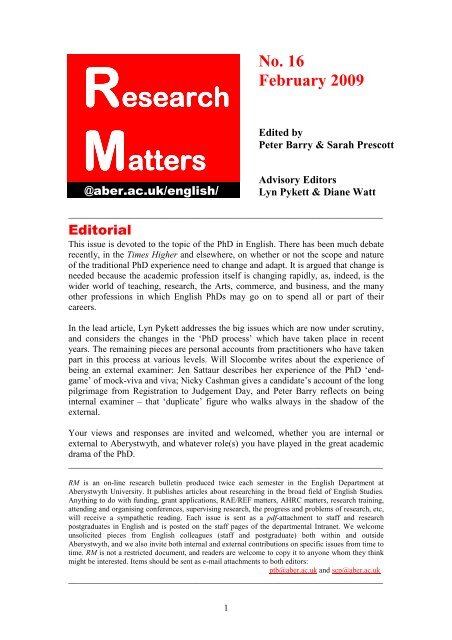
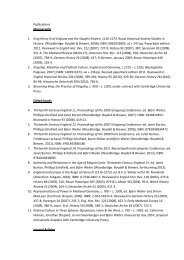
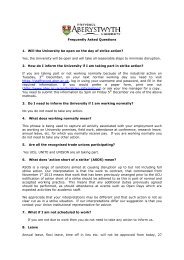

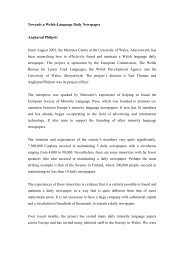
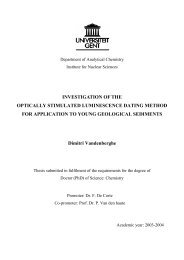
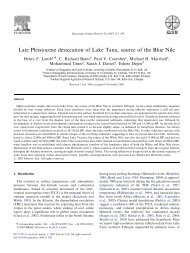
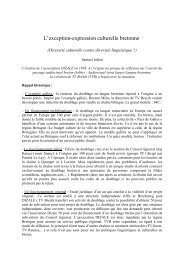
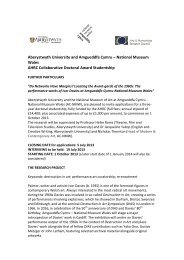
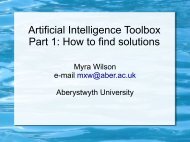
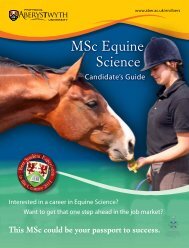
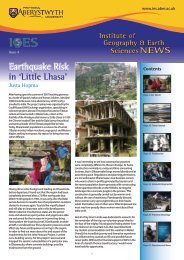
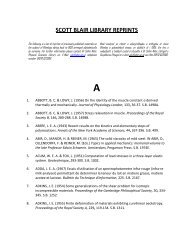
![[pdf] the council - Aberystwyth University](https://img.yumpu.com/8200062/1/184x260/pdf-the-council-aberystwyth-university.jpg?quality=85)
